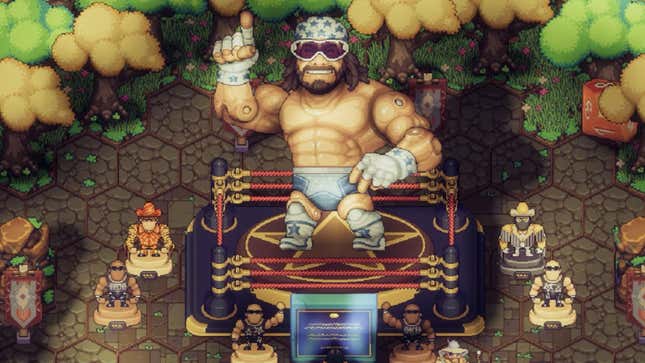
When I first played Square Enix’s Live A Live remake, its professional wrestling storyline planted in me a desire for a full-on wrestling role-playing game that exclusively featured wrestlers suplexing each other in the ring. Just one year later and I’ve gotten my wish with WrestleQuest, which fuses the turn-based gameplay of fantasy RPGs with the fantastical world of pro wrestling.
WrestleQuest, developed by Mega Cat Studios, follows “Muchacho Man” Santos, a living action figure in a world of toys, who works his way up underground wrestling companies in a flurry of matches seeking to become as big of a star as his hero, and real-life wrestler, “Macho Man” Randy Savage. I spoke with AEW wrestler and WrestleQuest executive producer Jeff Jarrett and Mega Cat Studios founder James Deighan to discuss how the team balanced the oft-impenetrable insider language of wrestling with the mechanics of role-playing games.
Read More: This Upcoming Pixel RPG May Be The Best Wrestling Game Of The Year
WrestleQuests presents wrestling concepts in a way that is familiar to JRPG fans
Deighan told Kotaku that folks at Mega Cat Studios are lifelong wrestling fans who have always wanted to make a JRPG. As the team started to explore wrestling and JRPGs, they realized that there was a huge crossover between JRPGs and pro wrestling through their shared foundation of story, larger-than-life characters, and dazzling combat.
One major sticking point that Mega Cat Studios wanted to achieve with WrestleQuest was nailing the authenticity of wrestling’s pageantry both inside and outside the squared circle. To achieve that, Dieghan said the studio’s guiding principle for the game’s four-year development was a term it coined called “wrestlification,” exploring how the classic mechanics and format of JRPGs could be brought to life through a wrestling lens.
“From the ground up, [WrestleQuest] was about making a love letter to wrestling that would appeal to both RPG gamers and wrestling fans. Any wrestling ‘insider’ terms are introduced in a way that is accessible for people that know nothing about wrestling,” Deighan said. “We were also meticulous about nesting wrestling concepts and tropes within JRPG mechanics.”
For example, WrestleQuest conveys wrestling lingo like “getting over” with the crowd or making them “pop” with gameplay mechanics like its Hype Meter, which measures the crowd’s excitement during a match. The Hype Meter builds based on how varied, and successful, your moves are in the ring.
“Many of us grew up with turn-based combat systems, but they can become boring after a while, where you are just spamming the attack button on auto-pilot,” said Deighan. “In WrestleQuest, however, every battle takes place as a wrestling match in front of a live audience, and you have to react to them and give them what they want. If you just keep spamming punches, they are going to get bored, so you have to approach combat with some showmanship and creativity.”
While WrestleQuest could have settled for replicating the public-facing side of wrestling, the game also baked in some of the behind-the-scenes terminology like “shoot” matches (where wrestlers aren’t pulling their punches) and burying talent (not letting them win when they’re scripted to) into its storyline. In WrestleQuest, players decide whether they want Muchacho Man to take the high road or “go into business for themselves” by making pivotal decisions throughout the game. This in-game mechanic echoes the real-life backstage politicking fans who follow the business read about in the “dirt sheets,” aka online wrestling gossip.
“We are wrestling fans first, and WrestleQuest wears this fandom on its sleeve, or maybe shades. We went out of our way to ensure that the stories we told about the wrestling world—from young rookies starting at the bottom and working their way up to the thrills of pay-per-view championship matches—were all authentic and true to the spirit of wrestling,” Deighan said.
On the RPG side of things, Dieghan revealed that WrestleQuest’s gameplay was inspired by classic JRPGs like Chrono Trigger, Final Fantasy VI, Earthbound, and Super Mario RPG.
But we didn’t stop by just borrowing elements, we took them and then wrestlified everything to create a truly unique game,” Dieghan said. “Everything from the theme and setting to the combat and mechanics are fresh and new for the JRPG space.”
‘Double J’ clicked with WrestleQuests’ authenticity from day one
Unlike most modern wrestling games like WWE 2K where matches are riddled with minigames that pull you out of the fun you could otherwise be having to beat up your opponents with sick wrestling moves, I found WrestleQuest to be an intuitive game that miraculously managed to balance the double-sided world of wrestling both in and out of the squared circle with approachable RPG mechanics.
When I asked Jarrett, who’s featured in wrestling games like WWF Attitude and TNA Impact!, what convinced him to get in on the ground floor of WrestleQuest as its executive producer, he said it was because its gameplay felt like a breath of fresh air and he clicked with Mega Cat Studios’ desire to bring his profession’s authenticity into the game.
“Most wrestling games lean hard into the simulation aspect of the battles in the ring, but WrestleQuest explores the world and stories beyond like nothing before. It’s this fresh take and the genuine fandom of these guys that drew me in and that makes WrestleQuest so special,” Jarrett said. “To take the electricity of a wrestling match and convey that through JRPG game mechanics—you have to be a true fan to capture that.”
Jarrett added that as “executive wrestling producer,” it was his duty to “to gut-check everything, and guitar shot them if they get off-base.”
WrestleQuest, after being delayed hours before its initial release date, is out now for Xbox One, Xbox Series X/S, PlayStation 4 and 5, Nintendo Switch, Windows, and the Netflix app.